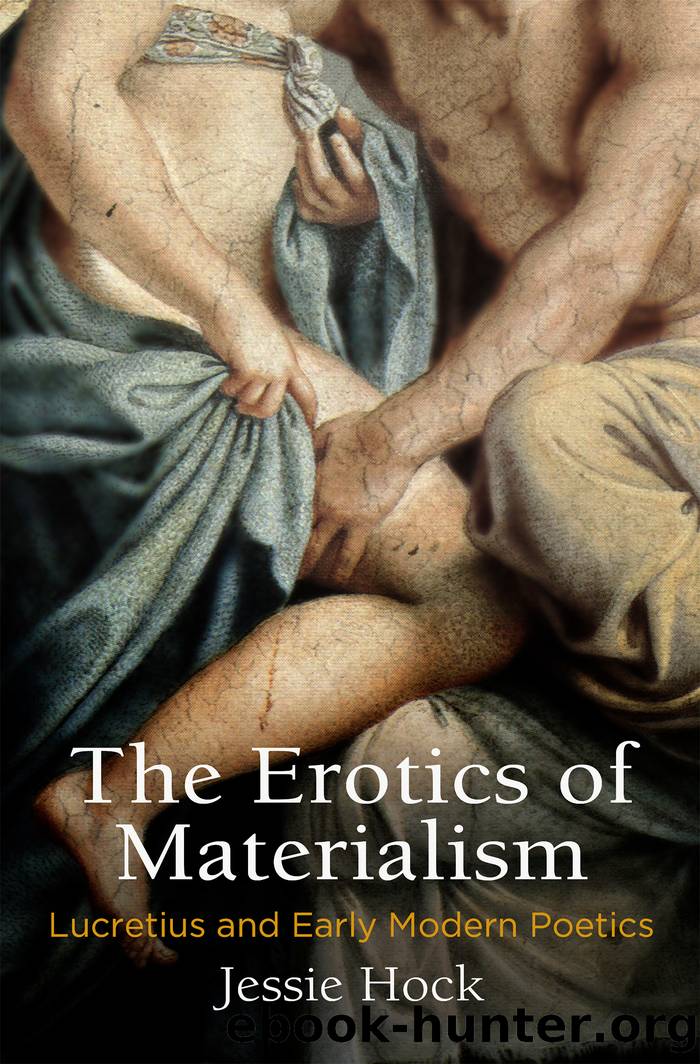The Erotics of Materialism by Jessie Hock;

Author:Jessie Hock;
Language: eng
Format: epub
Publisher: Lightning Source Inc. (Tier 2)
Published: 2020-12-14T16:00:00+00:00
Women and Lucretius in Seventeenth-Century England
Hutchinsonâs dedication participates in a tradition of erotic responses to DRN stretching from antiquity onward, and she was also actively engaged with contemporary conversations around Lucretius that also linked Lucretian poetry to questions of sex and gender. The erotic discourse surrounding DRN made the poem a lightning rod for early modern debates about women and reading. Anxiety over the morally corrupting influence of reading texts perceived as dangerousâparticularly pagan literature and sexually suggestive genres like romance or love lyricâwas exacerbated in seventeenth-century England by the increasing availability of texts in English, both translations of classical and continental texts and homegrown English renderings of classical and continental genres and styles. English-language texts came under particular suspicion because women, who were far less likely than men to have been taught foreign languages, especially ancient languages like Latin or Greek, could read them. Large sections of DRN were first made available to Englishspeaking audiences in John Florioâs translation of Michel de Montaigneâs Essais (1603), which contains approximately one-sixteenth of DRN in quotation. Because it was dedicated to a group of aristocratic women, Florioâs translation was understood to be directed toward a female audience. Reid Barbour and David Norbrook argue that Florioâs petition to women followed a pattern set by earlier French editions of the Essais: âMontaigneâs first editor, Marie de Gournay, was a champion of womenâs learning, establishing a pattern in which Epicurean ideas showed a strong appeal to female readers.â43
While Florioâs âenglishingâ of the classical authors, including Lucretius, quoted by Montaigne was remarked upon by readers and critics, English translators who tackled the entire DRN came under stronger fire. English translations of DRN, a notoriously atheistic and hedonistic text, were attacked as being expressly designed to seduce women. Thomas Creech encountered a barrage of criticism for his translation, some focused on the dangers an English Lucretius posed to the gentler sex. An anonymous detractor raged that ââ[t]was enough that Mr Hobbs seduced the Men [with atomist ideas]; too much that Mr Creech should debauch the Women with those corrupt Notions of a Deity, & by his soft Translation of a rough Piece melt the Ladies into admiration first of the Poetry & then of the Opinion.â44 Other commentators, however, applauded Creech for the very same reason. In her commendatory poem on Creechâs DRN, âTo the Unknown Daphnis on his Excellent Translation of Lucretius,â Aphra Behn praises the translator for rectifying gender inequalityâhe âEquallâst Vs to Man!ââby making the important classical text available in English.45 Behn boldly embraces the sexualized vocabulary associated with DRN, writing in the same poem that in Creechâs translation âReason over all unfetterâd Plays, / Wanton and disturbâd as Summers Breeze.â46 While Behn agrees with Hutchinson that DRN is âwanton,â she celebrates such wantonness as liberatory for women; Hutchinson would have strongly disapproved.
Seventeenth-century dialogues about the particular danger Lucretius posed to women intersected with ongoing debates about gender and style. The anonymous criticâs description of Creechâs DRN as a âsoft Translation of a rough
Download
This site does not store any files on its server. We only index and link to content provided by other sites. Please contact the content providers to delete copyright contents if any and email us, we'll remove relevant links or contents immediately.
| Anthropology | Archaeology |
| Philosophy | Politics & Government |
| Social Sciences | Sociology |
| Women's Studies |
Cecilia; Or, Memoirs of an Heiress — Volume 1 by Fanny Burney(31324)
Cecilia; Or, Memoirs of an Heiress — Volume 3 by Fanny Burney(30928)
Cecilia; Or, Memoirs of an Heiress — Volume 2 by Fanny Burney(30885)
The Great Music City by Andrea Baker(21195)
We're Going to Need More Wine by Gabrielle Union(18066)
Bombshells: Glamour Girls of a Lifetime by Sullivan Steve(13101)
Pimp by Iceberg Slim(12923)
All the Missing Girls by Megan Miranda(12740)
Fifty Shades Freed by E L James(12443)
Norse Mythology by Gaiman Neil(11875)
Talking to Strangers by Malcolm Gladwell(11864)
Crazy Rich Asians by Kevin Kwan(8342)
Mindhunter: Inside the FBI's Elite Serial Crime Unit by John E. Douglas & Mark Olshaker(7829)
The Lost Art of Listening by Michael P. Nichols(6464)
Enlightenment Now: The Case for Reason, Science, Humanism, and Progress by Steven Pinker(6403)
Bad Blood by John Carreyrou(5762)
The Four Agreements by Don Miguel Ruiz(5502)
Weapons of Math Destruction by Cathy O'Neil(5031)
We Need to Talk by Celeste Headlee(4862)
